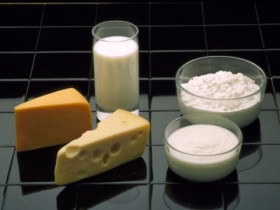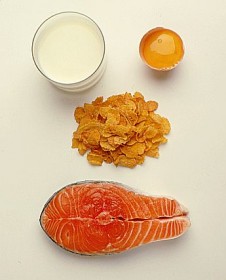 There are so many reasons we eat healthy; for our hearts; to lose/maintain our weight; to keep our blood pressure low; for energy; to boost our immune system; etc. But we most likely rarely think about the health of our bones as we make the choices for this evening’s meal.
There are so many reasons we eat healthy; for our hearts; to lose/maintain our weight; to keep our blood pressure low; for energy; to boost our immune system; etc. But we most likely rarely think about the health of our bones as we make the choices for this evening’s meal.
There are many risk factors for osteoporosis, or the weakening of our bones. The older we get, the more bone density is lost. So, we have to strengthen our bones as much as possible starting as early as possible. Women, who already have lighter and thinner bones than men, tend to lose bone mass more rapidly after menopause due to lack of estrogen. Heredity and genetics can also make us more prone to this disease; as can broken bones.
These things all seem pretty predisposed and unchangeable. But, what risk factors can we control? Well, the choices that we make when eating today can dramatically affect our chances for getting osteoporosis in the future.
Calcium
 Everybody knows that drinking milk helps your bones stay strong – at least that’s what we always tell our kids. One of the nutrients in milk that makes it such a powerhouse for our bones is calcium. Of course, low fat dairy like milk, yogurt and cheese are great sources of calcium. However, you can also find significant amounts in soy milk, fortified orange juice and cereals, dark green leafy veggies like kale and bok choy, and sardines or salmon – with the bones! If you’re under 50, you need about 1000 mg per day (or 3 cups of milk), and that goes up to 1200 mg (or 4 cups of milk) once you turn 50. Don’t take in more than 2500 mg/day. If you try, but just can’t get enough calcium rich foods in your diet, you should consider a calcium supplement. To maximize absorption, don’t take more than 500 mg of calcium at one time, though.
Everybody knows that drinking milk helps your bones stay strong – at least that’s what we always tell our kids. One of the nutrients in milk that makes it such a powerhouse for our bones is calcium. Of course, low fat dairy like milk, yogurt and cheese are great sources of calcium. However, you can also find significant amounts in soy milk, fortified orange juice and cereals, dark green leafy veggies like kale and bok choy, and sardines or salmon – with the bones! If you’re under 50, you need about 1000 mg per day (or 3 cups of milk), and that goes up to 1200 mg (or 4 cups of milk) once you turn 50. Don’t take in more than 2500 mg/day. If you try, but just can’t get enough calcium rich foods in your diet, you should consider a calcium supplement. To maximize absorption, don’t take more than 500 mg of calcium at one time, though.
Vitamin D
 Vitamin D, a mineral that helps our bodies process calcium, is very important to bone health. Children need it to build strong bones and adults need it to keep their bones strong. There are three ways for our bodies to absorb vitamin D: sunlight, supplements and medications, and, of course, through food.
Vitamin D, a mineral that helps our bodies process calcium, is very important to bone health. Children need it to build strong bones and adults need it to keep their bones strong. There are three ways for our bodies to absorb vitamin D: sunlight, supplements and medications, and, of course, through food.
Vitamin D is naturally available in only a few foods, so getting enough vitamin D through food alone is pretty tough. That is why it is important to also make sure that we also get vitamin D through sunlight and supplements.
Fatty Fish like mackerel, salmon and tuna are excellent sources of vitamin D. Vitamin D is also added to milk and some other products like orange juice, soy milk and cereals. Check the nutrition labels to see if vitamin D has been added. One eight ounce serving of milk usually has about a quarter of our daily value of vitamin D. So, start your day off with a cold glass of milk, or better yet, some milk on your cereal and a small glass of orange juice with vitamin D added, and you are on your way!
Eat Your Veggies
Not only do many veggies have calcium, but they also have important nutrients such as magnesium, potassium and vitamin K that are also important for healthy bones.
Lay off the Protein, Sodium and Caffeine
 Too much of these elements in food can cause the body to lose calcium. It is important to eat enough protein for overall health, but eating too much can lead to loss of calcium and therefore bone loss.
Too much of these elements in food can cause the body to lose calcium. It is important to eat enough protein for overall health, but eating too much can lead to loss of calcium and therefore bone loss.
Just eat a balanced diet that includes lean protein, whole grains, fruits and vegetables and low-fat dairy and you will get just enough, but not too much.
Try to limit the amount of processed foods that you eat, which are high in sodium or salt. Sodium also causes your body to lose calcium. To see if a food is high in sodium, look at the nutritional label. If it lists 20% or more for the daily value, it is too high.
Don’t worry; you can still have your morning cup of coffee without compromising your bone health. When we ingest too much caffeine, however, it can affect the body’s calcium absorption. So, try to limit the consumption of caffeinated drinks to one or two a day.
More of the same old…
As always, the way we eat is only half the battle. Practicing a healthy lifestyle – not smoking, being active (especially weight bearing exercises like walking, aerobics and strength training), limiting alcohol and maintaining a healthy weight – will also help you to keep your bones healthy for the long-run.
For more information about healthy lifestyle, visit www.chestercountyhospital.org.
This message is brought to you by The Chester County Hospital and Health System.




